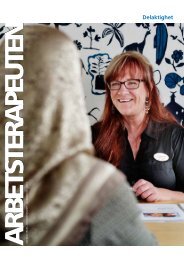TILLVÄGAGÅNGSSÄTT OCH FÖRHÅLLNINGSSÄTT I ... - FSA
TILLVÄGAGÅNGSSÄTT OCH FÖRHÅLLNINGSSÄTT I ... - FSA
TILLVÄGAGÅNGSSÄTT OCH FÖRHÅLLNINGSSÄTT I ... - FSA
You also want an ePaper? Increase the reach of your titles
YUMPU automatically turns print PDFs into web optimized ePapers that Google loves.
SAMMANFATTNING<br />
Syftet med studien var att genom narrativa berättelser identifiera förhållningssätt och<br />
tillvägagångssätt hos rehabiliteringsledaren i förändringsprocessen från sjukroll till delaktig<br />
samhällsmedborgare för personer som lider av psykisk ohälsa, med hjälp av arbetslivsinriktad<br />
rehabilitering. Metoden som användes var kvalitativa forskningsintervjuer av fyra<br />
rehabiliteringsledare. Analysen gjordes med hjälp av en narrativ metod beskriven av<br />
Mattingly. Resultatet visade att rehabiliteringsledaren måste ha en hög beredskap att rycka ut<br />
vid problematiska situationer och inta en mångfald av olika roller beroende på vilket problem<br />
eller vilken insats som stödjer individen att fortsätta sin process. Rehabiliteringsledaren<br />
lyssnade på önskemål, gav stöd och agerade i att praktiskt genomföra dem och sedan<br />
coachade klienten för att kunna behålla dem. En meningsfull sysselsättning på en arbetsplats<br />
klienterna själva önskat, valt och trott att de skulle må bra och känna sig trygga i, var grunden<br />
för arbetet. Den största arbetsinsatsen gjordes för att få klienten att behålla det den skaffat sig<br />
i form av värderade roller och miljöer. Genom en nära relation till både klient och<br />
arbetsgivare var rehabiliteringsledaren en inspirationskälla som ingav hopp och motiverade<br />
klienten till den fortsatta rehabiliteringsprocessen. Samtidigt främjade de för en förståelse,<br />
tolerans, kunskap och attitydförändring hos de arbetsgivare klienten praktiserade eller<br />
arbetade hos för att de skulle kunna behålla arbetsplatsen trots de motgångar som uppkom i<br />
de långa rehabiliteringsprocesserna. Resultatet visade också att det minst var lika viktigt att<br />
kunna lägga fokus på rehabiliteringsarbetet i klientens privatliv för att kunna lyckas på sitt<br />
arbete.<br />
ABSTRACT<br />
The aim of this study was to, through narrative stories, identify the professional behaviour and<br />
course of actions of the rehabilitation leader in the changing process from the role of patient<br />
to the role of participating member of the society, by using vocational rehabilitation for<br />
persons with psychiatric disabilities. The method used was qualitative interviews with four<br />
rehabilitation leaders. The analysis was made through a narrative method as described by<br />
Mattingly. Findings highlighted how the rehabilitation leader must have a high readiness for<br />
actions in problem solving and undertake essential tasks related to multiple roles to solve the<br />
problem and support the client to continue the rehabilitation process. The rehabilitation leader<br />
listened for special requirements, gave the support and acted to carry through and then<br />
coached the client to retain their requirements. The basic condition for the rehabilitation work<br />
was to help and support the clients in finding a meaningful occupation at a workplace that<br />
they required, choose and thought would be a safe and healthy place for them to recover. The<br />
greatest effort for the rehabilitation leader was to support the clients in keeping their gained<br />
valued roles and environments. An essential action for the rehabilitation leader, and a<br />
necessary condition for the rehabilitation process were to through a close relationship to both<br />
clients and employer be a source of inspiration and hope that motivated the clients to continue<br />
with their processes. At the same time the rehabilitation leader promoted an understanding,<br />
tolerance, knowledge and change of attitude of the employers in order to keep the workplaces<br />
for the client despite the adversities that occurred during the rehabilitation process. The<br />
findings also showed that besides focusing on a working role at a workplace it is of great<br />
importance to also put the rehabilitation focus on other parts of the clients’ life in order to<br />
gain and keep a working role.<br />
Key words: Occupational therapy, clinical reasoning, psychiatric rehabilitation, occupation,<br />
vocational rehabilitation









